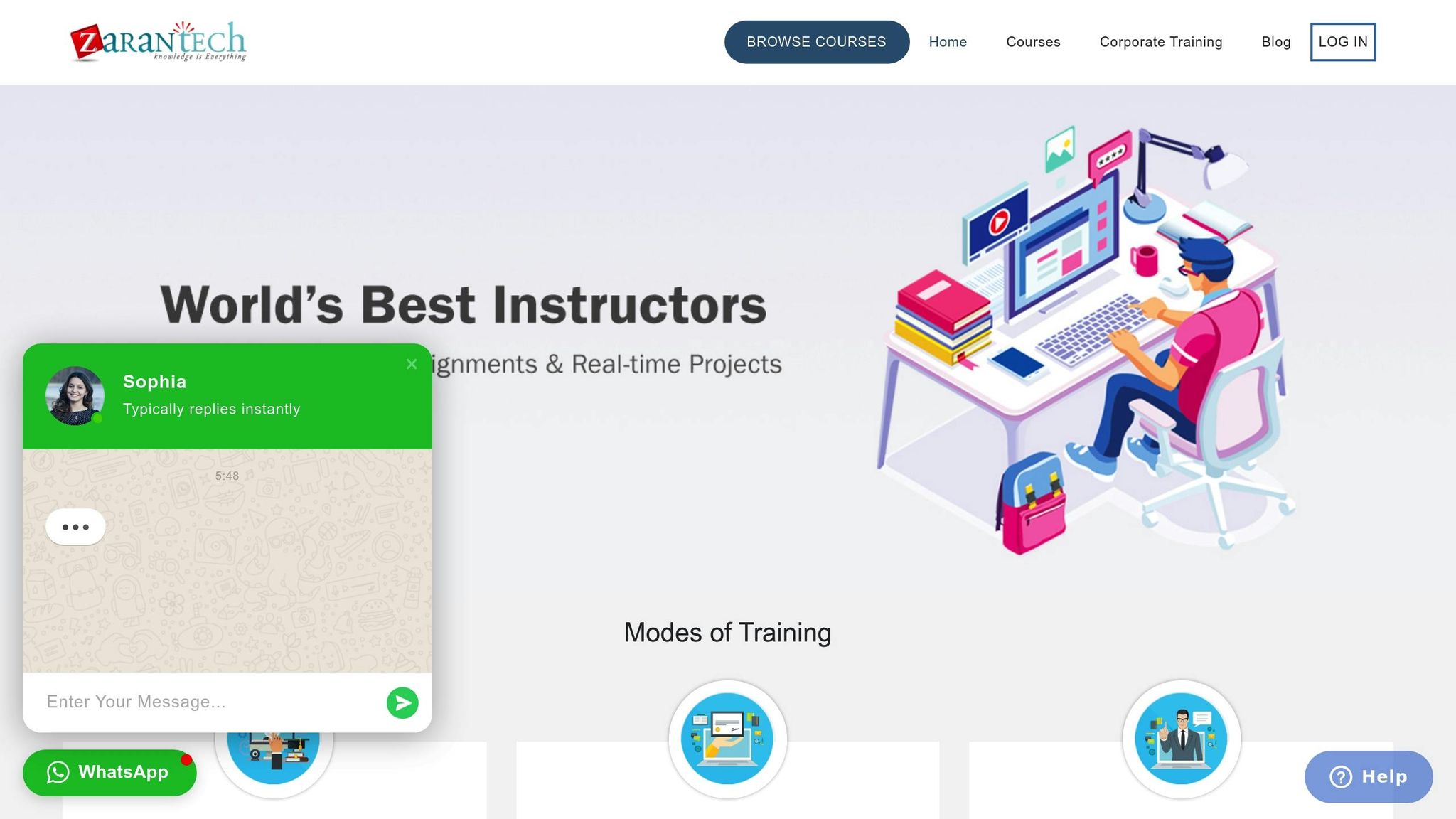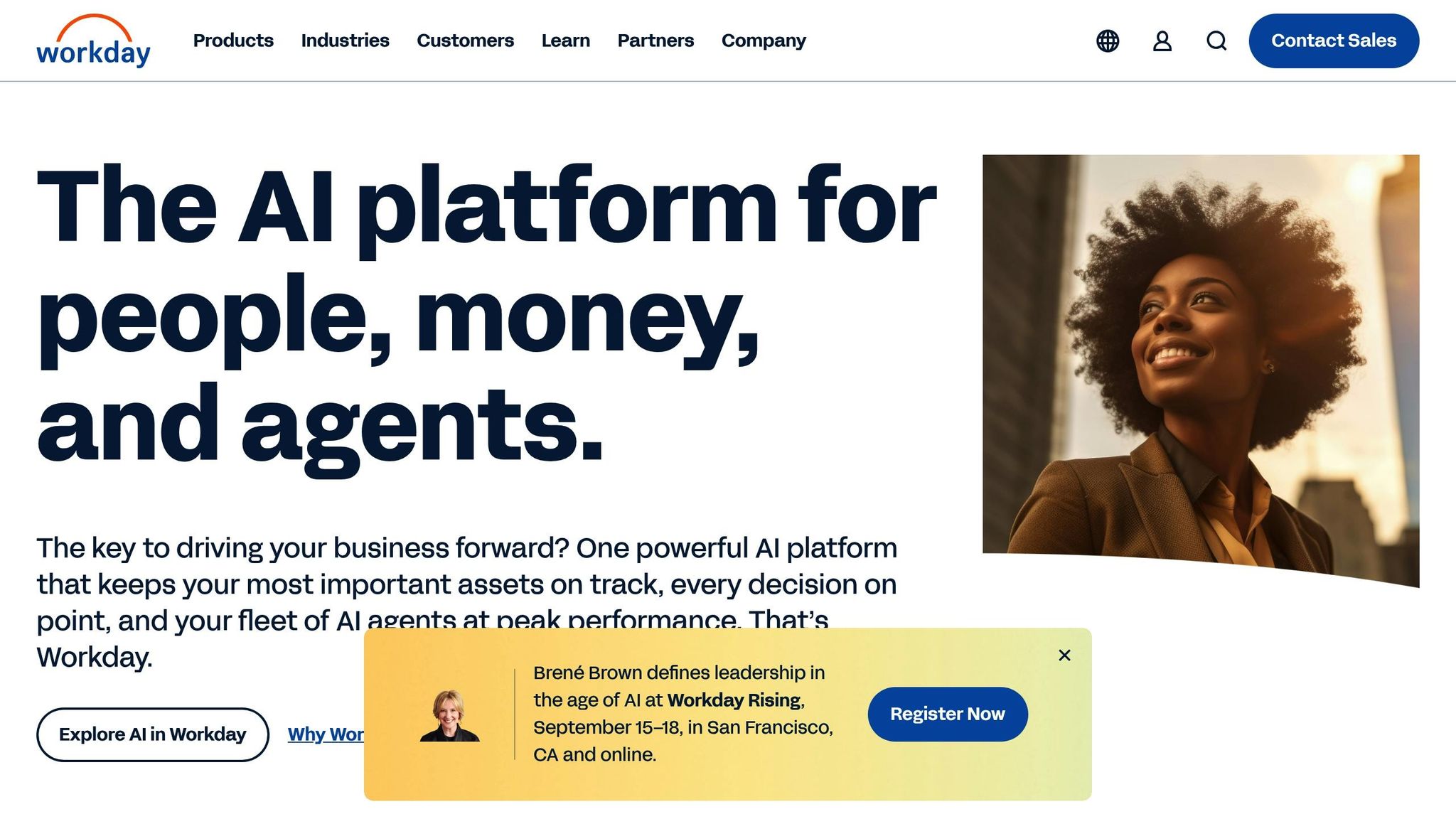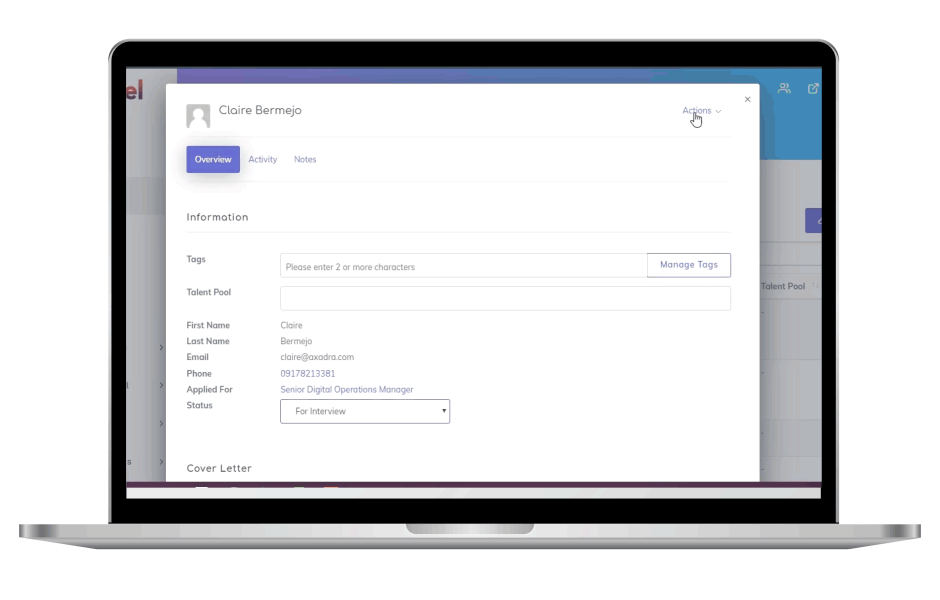Choosing the right HR software depends on your company’s size and hiring needs. BambooHR is tailored for small to mid-sized businesses, offering a simple, user-friendly interface ideal for teams with fewer than 350 employees. Workday, on the other hand, caters to large enterprises, providing advanced recruitment tools and integrations suitable for complex, high-volume hiring.
Key Takeaways:
- BambooHR: Best for small businesses needing basic applicant tracking and streamlined workflows. Starts at $10 per employee/month.
- Workday: Designed for large organizations managing complex HR operations. Costs range from $100–$200 per employee/year.
Quick Comparison:
| Feature | BambooHR | Workday |
|---|---|---|
| Target Audience | Small to mid-sized businesses | Large enterprises |
| Applicant Tracking | Basic tools for job postings, resumes | Advanced sourcing, AI-driven matching |
| Integrations | 150+ pre-built, API options | Enterprise-level, real-time syncing |
| Automation | Simplifies key tasks | Handles high-volume, complex workflows |
| Pricing | Starts at $10/employee/month | $100–$200/employee/year |
Bottom Line: BambooHR is affordable and simple, while Workday offers scalability and advanced features for enterprises.
Simplify Your Workflow: 3 Essential HR Tools for Success! | ZaranTech #Shorts
BambooHR Overview
BambooHR has carved out a niche as a top-tier HR solution tailored for small- to mid-sized businesses that need straightforward recruitment tools without unnecessary complications. It earned the title of the #1 rated HR Software in 2024 and is widely praised for its focus on improving employee engagement and satisfaction. Designed with simplicity in mind, BambooHR’s intuitive interface is especially helpful for organizations lacking dedicated HR teams.
Anne Seebach, Head of People & Culture at Architrave, highlights the platform’s user-friendly nature:
"It’s the perfect tool for people who have never worked with ATS before. They don’t have to be afraid to be overloaded with information. It is very self-explaining."
Similarly, Angie Liams, HR Manager at CRBR, emphasizes how BambooHR saves both time and resources:
"BambooHR saves us from having an entire team of HR people. It saves time in training employees or supervisors and managers – half-hour increments here and there versus days compiling information."
This focus on simplicity and usability contributes to BambooHR’s strong recruitment capabilities.
BambooHR Recruitment Features
BambooHR’s Applicant Tracking System (ATS) offers a streamlined hiring solution that automates every stage of recruitment, from job postings to onboarding. The system simplifies tasks like candidate communication, digital offer letters, and detailed reporting. It also supports team collaboration with features such as custom permissions, automatic alerts, and in-system messaging. With tools like custom job posts and mobile app access, hiring activities become more efficient and accessible.
A notable example of BambooHR’s efficiency was during the COVID-19 pandemic when the Centre for Family Medicine successfully hired 110 people in just two weeks, proving its capability for handling high-volume hiring. Additionally, the platform ensures a seamless transition from recruitment to onboarding with customizable new-hire packets, creating a consistent and smooth experience for employees.
BambooHR Integration Options
Beyond recruitment, BambooHR enhances overall HR operations with a robust integration ecosystem. The BambooHR Marketplace offers over 150 pre-built integrations that connect with payroll systems, job boards, time-tracking tools, and performance management applications. These integrations help eliminate data silos, reduce manual data entry, and minimize errors. In fact, nearly two-thirds of BambooHR users leverage multiple integrations to streamline their processes.
For instance, the Indeed integration allows users to publish job listings directly from BambooHR, while Checkr‘s AI-powered background checks integrate seamlessly into the hiring workflow. Organizations can also use API integrations to build custom connections, ensuring accurate data across their HR tools. BambooHR further automates complex workflows – handling tasks like posting job vacancies, scheduling interviews, and collecting candidate feedback across platforms – turning recruitment from a manual chore into an efficient, coordinated process.
Workday Overview
Workday is a robust HR platform tailored for managing high-volume, complex recruitment tasks. Trusted by thousands of large organizations, Workday Recruiting is part of a cloud-based Human Capital Management (HCM) suite that handles everything from hiring to workforce planning across multiple locations.
What sets Workday apart is its ability to grow alongside organizations. As one Senior Director of People Operations shared:
"8×8 is a growing company going through a transformational shift. We chose Workday for its ability to scale with us as we grow."
Workday’s integrated HR approach connects recruiting with payroll, benefits, and workforce analytics. This setup is particularly beneficial for large enterprises navigating complicated structures and compliance needs. It also enables advanced recruitment features that streamline the hiring process.
The platform has been recognized as a Leader in the 2024 Gartner® Magic Quadrant™ for Cloud HCM Suites and boasts an impressive record of completing over 95% of customer deployments on schedule in FY24.
Workday Recruitment Features
Workday’s recruitment tools are built on its integrated HCM foundation, offering features designed for efficiency and scalability. The platform uses AI-driven candidate matching and automated workflows to handle thousands of applications seamlessly. Unlike basic applicant tracking systems, Workday includes bulk actions, standardized processes, and automation that simplify high-volume hiring.
One standout feature is HiredScore AI, which provides real-time diversity insights, talent rediscovery, and intelligent candidate grading to support data-driven hiring decisions. Additionally, teams can access detailed analytics, such as candidate skill comparisons, pipeline metrics, and tracking the effectiveness of different sourcing channels, to continually refine their recruitment strategies.
Leighanne Levensaler, Vice President of Human Capital Management Products at Workday, highlights the platform’s comprehensive functionality:
"Workday Recruiting looks, feels, and functions unlike anything in the market, because it was built to benefit every person involved in the hiring process. Whether it’s an applicant on the bus, a manager at their desk, or an executive in the boardroom, the application enables candidates and hiring teams to take action no matter where they are."
Real-world examples showcase Workday’s impact. For instance, the City and County of Denver integrated Workday’s HCM suite, including Recruitment, and cut 75% of manual paper processes. They also automated over 6,600 HR tasks, reducing their time-to-hire from 90 days to just 45–50 days. Similarly, John Muir Health standardized reporting and saved significant time by adopting Workday’s Recruiting and Onboarding modules, streamlining job postings and new hire processing.
Another key feature is granular permission settings, which allow organizations to control roles and access levels, ensuring secure data handling and clear accountability across workflows.
Workday Integration and Compliance
Workday simplifies HR operations by integrating systems and eliminating manual data entry. This addresses a common challenge: research shows the average HR department uses five different software systems, with 50% of them performing overlapping functions.
Workday’s global compliance framework supports operations in 240 countries, regions, and territories. The platform also provides regular regulatory updates for 58 jurisdictions through a network of legal experts, helping organizations stay compliant with evolving employment laws. Additionally, it maintains applicant records and audit trails to ensure adherence to equal employment opportunity (EEO) laws and other regulations.
As Workday emphasizes:
"With our global-at-the-core design and commitment to privacy and security, you can keep pace with compliance while increasing trust with your employees and customers."
Data security is a top priority, with the platform meeting strict standards like GDPR and HIPAA. It also offers tools for policy management, employee training tracking, and secure data handling.
A practical example comes from EOS North America, where the HR administrator saves about 15 hours per week by using Workday’s data integration capabilities. This improvement eliminated manual updates and reduced concerns about mismatched information across systems.
For organizations with complex integration needs, Workday’s structured approach is invaluable. Mark Jenkins, Vice President of Human Resources at Logicalis, shared his experience:
"It’s important to do integrations in a logical fashion, and the Flexspring team is very methodical in its approach. They easily took us through the process of mapping standard and custom fields – and that’s usually a painful experience. We’re very happy with the partnership."
Side-by-Side Feature Comparison
Let’s break down how BambooHR and Workday compare when it comes to features, highlighting how they cater to different business sizes and recruitment needs.
Applicant Tracking System Features
BambooHR’s applicant tracking system (ATS) is tailored for small to mid-sized businesses. It simplifies core recruiting tasks like managing job applicants, posting job openings, reviewing resumes, and keeping in touch with candidates – all through an easy-to-use interface. While it covers the basics well, it doesn’t come with built-in tools for candidate sourcing or recruitment marketing. This means you’ll likely need to rely on outside job boards or additional tools to support your hiring campaigns.
Workday, on the other hand, is built for large enterprises with more complex hiring demands. Its ATS offers a full-service solution, handling everything from sourcing candidates to recruitment marketing. It also includes advanced evaluation tools, such as skills assessments, pre-employment tests, and automated scoring, making it ideal for businesses managing high volumes of applicants.
| Feature | BambooHR | Workday |
|---|---|---|
| Target Audience | Small to mid-sized organizations | Large enterprises with complex needs |
| Candidate Sourcing | No built-in sourcing features | Built-in sourcing tools included |
| Recruitment Marketing | No built-in capabilities | Integrated campaign management |
| Candidate Evaluation | Basic evaluation tools | Advanced assessments and scoring |
| Job Board Integration | Standard posting capabilities | Comprehensive social media and job board integration |
Workflow Automation Tools
Both platforms use automation to streamline recruitment workflows, but they differ in scale and complexity.
BambooHR focuses on automating tasks like job postings, candidate communication, digital offer letters, and reporting. Its simplicity makes it a great fit for smaller teams, especially when quick hiring is a priority. This makes it particularly effective for businesses that need to scale up their workforce on short notice.
Workday takes automation to the next level, offering tools designed for large-scale hiring and complex HR processes. It supports bulk actions, standardized workflows, and advanced automation capable of managing thousands of applications. In fact, Workday’s automation features have been shown to reduce payroll errors by as much as 85%.
HR Technology Integrations
Integration is key to ensuring a smooth fit with your existing tools, and both platforms offer useful options – but at different levels.
BambooHR connects with popular tools like Slack, Zapier, and G Suite. It also offers APIs and webhooks, making custom integrations possible. This flexibility helps HR teams keep data in sync across various applications without much hassle.
Workday, however, is designed for enterprise-level integration needs. It connects seamlessly with a broad range of third-party systems, including finance, ERP, and time-tracking solutions. Workday also features a robust marketplace of pre-built integrations, along with real-time data syncing and advanced reporting tools. These capabilities make it an excellent choice for large organizations with diverse and complex tech ecosystems.
sbb-itb-e5b9d13
When to Use Each Platform
Selecting the right recruitment platform comes down to factors like company size, hiring complexity, and specific needs. BambooHR and Workday cater to different types of businesses, each with its own challenges and priorities.
BambooHR for Small- to Mid-Sized Companies
For small- to mid-sized businesses, recruitment can be a costly and time-consuming process. With the cost of hiring an employee reaching three to four times the position’s salary, these companies need tools that streamline hiring without breaking the bank.
BambooHR is an excellent fit for businesses with fewer than 350 employees that require straightforward, efficient recruitment solutions. Starting at $250 per month, it’s an affordable option for organizations that can’t justify the expense of enterprise-level platforms.
Its simplified workflows are especially helpful given that the average time-to-hire has stretched to 44 days. Tech companies, in particular, find its ease of use valuable – 86% of tech firms report hiring talent as a significant challenge, and between 2016 and 2019, tech employers managed to fill only six out of every 10 open roles.
However, businesses with larger operations or more intricate hiring needs may find BambooHR’s capabilities somewhat limited.
Workday for Large Organizations
Workday, on the other hand, is built for large organizations that deal with high-volume hiring and complex recruitment demands. Its features are tailored to scale with growing companies while ensuring compliance and operational consistency.
Serving 25,473 customers, Workday is designed to support thousands of employees across multiple locations. Its advanced tools – such as bulk candidate processing, standardized workflows, in-depth analytics, and seamless integrations – make it the go-to choice for enterprises managing complex recruitment. For rapidly expanding companies, Workday’s scalable infrastructure easily adapts to increasing demands without requiring extensive reconfiguration.
This makes Workday a powerful solution for organizations that need to balance growth and operational efficiency.
Pricing Comparison
Understanding the cost structure of each platform is crucial for businesses to make decisions that align with their budgets and expected returns. Both BambooHR and Workday operate on subscription-based models, but their pricing strategies differ quite a bit.
BambooHR Pricing Plans
BambooHR offers three main pricing tiers: Core, Pro, and Elite. The Core package starts at $10 per employee per month, making it a budget-friendly option for smaller businesses venturing into HR technology. Instead of listing detailed pricing on their website, BambooHR provides custom quotes tailored to the specific needs of each business. Discounts are available for organizations with more than 26 employees, as well as for nonprofits and healthcare groups. Depending on company size and feature requirements, annual costs typically range from $15,000 to $120,000.
In addition to the monthly subscription, there’s a one-time implementation fee that covers setup and employee data migration. Other potential charges include $7 per month for each additional state added for payroll compliance, as well as fees for services like custom report creation, direct deposit reversals, and W-2 corrections. Premium support tiers and advanced API usage or custom integrations may also come with extra costs. To help businesses assess its platform, BambooHR offers a 7-day free trial.
"BambooHR offers solid value, especially for small to medium-sized teams looking to streamline HR tasks. It shines in onboarding and integrates well with other tools, which makes daily operations smoother and helps improve employee satisfaction." – Crystal Pinney-Ramos, HR Technology Strategist, cClearHR
On the other hand, Workday targets larger enterprises with a more intricate pricing model.
Workday Pricing Structure
Workday’s pricing is more complex and depends on factors like the number of Full-Service Equivalent (FSE) workers, selected modules, and implementation requirements. Its Human Capital Management (HCM) modules typically cost $100–$200 per employee per year, with total annual expenses ranging from $22,000 to $180,000, based on the features and plans chosen.
Implementation fees can add 10%–50% to the annual subscription cost. Training costs are another consideration, with instructor-led sessions priced at $500–$800 per day, while self-paced programs range from $1,500 to $7,000 annually. Businesses opting for premium support may pay an additional 10%–20% of the subscription fee.
These higher costs reflect Workday’s enterprise-level capabilities, making it a better fit for large organizations with complex needs. For smaller companies, however, the investment might be harder to justify. But for enterprises managing thousands of employees, Workday’s extensive features can provide considerable value.
Final Recommendations
Choosing between these platforms comes down to factors like company size, hiring demands, and integration needs. Here’s a quick rundown of what each platform brings to the table to help you decide.
BambooHR is ideal for small- to mid-sized businesses with fewer than 350 employees. Its user-friendly interface makes onboarding and managing basic applicant tracking a breeze. Plus, its pricing is straightforward – based on employee count – which keeps costs predictable. With pre-built integrations for tools like Slack, Zapier, and G Suite, implementation is smooth and hassle-free.
Workday is better suited for large enterprises handling complex HR operations and high-volume hiring. It offers advanced talent acquisition tools and a robust onboarding system, making it a solid choice for scaling recruitment efforts. Workday also integrates seamlessly with enterprise systems like finance and ERP, and its predictive analytics and 24/7 customer support add extra value for organizations ready to make a larger investment.
User feedback highlights these distinctions. BambooHR has a 4.3/5 rating from 300 reviews, praised for its simplicity and ease of setup. Meanwhile, Workday HCM scores 4.5/5 from 756 reviews, with users valuing its extensive features and scalability.
For companies planning rapid growth, Workday’s scalability is a major advantage. On the other hand, small- to mid-sized businesses with steady operations will appreciate BambooHR’s straightforward and cost-effective approach.
FAQs
What should small businesses consider when deciding between BambooHR and Workday for recruitment and HR management?
When deciding between BambooHR and Workday, small businesses need to consider factors like budget, company size, and the specific features they require. BambooHR is often the go-to choice for smaller organizations. It’s more affordable, easy to use, and tailored for businesses with fewer than 350 employees. Its strengths lie in handling essential HR tasks such as managing employee records, tracking time off, and streamlining simple workflows.
On the flip side, Workday offers a more extensive set of features, including advanced organizational charts and highly customizable onboarding processes. It’s a strong option for growing businesses with more complex needs. However, it tends to be pricier and can be challenging for smaller teams to implement. Take a close look at your company’s growth trajectory and operational priorities to figure out which platform best supports your long-term goals.
What are the key differences in how BambooHR and Workday integrate with existing HR systems, and how could this affect your organization?
Integration Capabilities: BambooHR vs. Workday
When it comes to integration, BambooHR and Workday cater to different needs, and understanding their strengths can help you decide which fits your HR setup better.
Workday is built for complexity. It offers a powerful API and a range of pre-built connectors, making it a solid choice for large organizations with intricate IT environments. Its ability to integrate seamlessly with various enterprise systems ensures smooth data flow, which is crucial for businesses managing vast amounts of HR data across multiple platforms.
On the flip side, BambooHR prioritizes simplicity. It’s designed to work effortlessly with popular third-party apps and cloud services, making it ideal for small to mid-sized businesses that might lack extensive technical expertise. Its user-friendly approach ensures that integrations are quick and straightforward, without the need for heavy IT involvement.
In essence, if your business relies on a complex HR infrastructure, Workday’s advanced integration capabilities can be a game-changer. Meanwhile, BambooHR’s straightforward integrations are perfect for companies looking for ease and efficiency without the technical overhead. The right choice can significantly influence how well your HR systems operate and maintain data accuracy.
What makes Workday’s recruitment features ideal for large companies with complex hiring needs?
Workday’s recruitment tools are tailored for large companies with complex hiring needs. They offer automation from start to finish, simplifying tasks such as tracking applicants, scheduling interviews, and onboarding new hires. With real-time insights, businesses can keep an eye on critical metrics and make informed decisions to refine their hiring strategies.
What sets Workday apart is its ability to integrate effortlessly with other HR systems, ensuring smooth operations across different teams. These features allow enterprises to handle high-volume hiring with ease, improve the candidate experience, and remain compliant with various regulations, making it a dependable solution for intricate recruitment challenges.















